PSNI: Byrne refuses to step down as chief constable
Simon Byrne has said he is not resigning following an unprecedented emergency meeting with the Northern Ireland Policing Board on Thursday.
Pressure has been mounting on the PSNI chief constable after a number of recent controversies.
He said an appeal against a High Court ruling on Tuesday is being considered.
The chair of the Police Federation said he was "disgusted and angered" by Mr Byrne's statement, adding that he "has to be condemned".
Ulster Unionist Party leader Doug Beattie called on the chief constable to stand down.
On Tuesday, the High Court ruled that two junior officers were unlawfully disciplined for an arrest made at a Troubles commemoration event.
The judge said they were disciplined to allay a threat that Sinn Féin could withdraw its support for policing, but Sinn Féin insisted that there was no such threat.
Mr Byrne said he accepted the findings of the court.
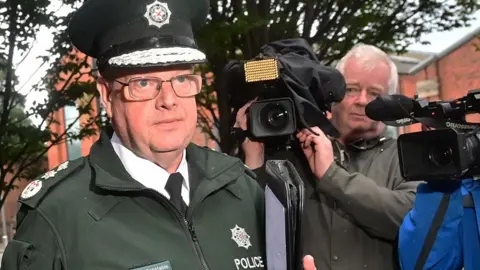 Pacemaker
PacemakerSpeaking to press after the meeting - which lasted more than six hours - Mr Byrne said after "carefully reviewing the full judgement", he had sought further advice.
"After consideration, the question of an appeal is now live," he added. "Further public commentary around this matter is not appropriate at this stage."
"I'm not resigning," Mr Byrne said.
Asked if he still retained the confidence of the board, he said that was a "matter for the policing board".
'Has to be condemned'
The Police Federation for Northern Ireland - a union which represents rank-and file officers - said its members expressed "disbelief and anger" at Mr Byrne's statement.
Its chair, Liam Kelly, said Mr Byrne has "gone volte face" by considering an appeal after publicly accepting the ruling.
"If he does appeal, we expect he will use the PSNI budget which is already stretched to breaking point. In effect, he would be appealing against his own actions against his own officers, dragging this matter out both internally and externally," Mr Kelly said.
He added Mr Byrne's statement has "infuriated and antagonised the rank and file further" and "has to be condemned".
Earlier on Thursday, the federation said it has called an "extraordinary" meeting of its executive central committee next Wednesday to discuss the outcome of Tuesday's judgement and concerns over the PSNI's leadership.
The committee will then determine whether or not to hold a vote of confidence in Mr Byrne.
"I had hoped to refrain from saying anything publicly until the extraordinary meeting of my executive central committee next Wednesday," Mr Kelly added.
"However, such is the outrage that has been expressed by the rank and file, on behalf of the two officers and my colleagues, I feel I have no other option but to call it out - in short, I am disgusted, disillusioned and extremely angry."
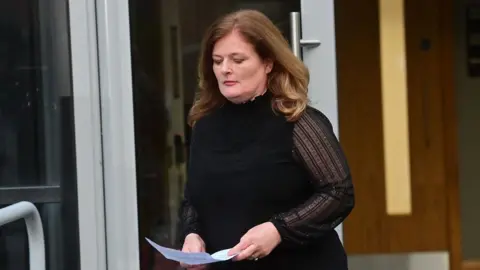 Pacemaker
PacemakerChair of the Northern Ireland Policing Board Deirdre Toner described Thursday's meeting as "intensive".
She said that, regarding the Troubles commemoration, on Belfast's Ormeau Road in February 2021, Mr Byrne and PSNI Deputy Chief Constable Mark Hamilton had accounted for "the discussions, actions and decisions that were taken at that time".
"It was important for the board to question and seek clarity on matters within [Tuesday's High Court] judgement, given the legal and leadership responsibilities placed on the chief constable and deputy chief constable," she said.
Ms Toner said "it has become clear that there are now legal issues that the board needs to consider and receive advice on".
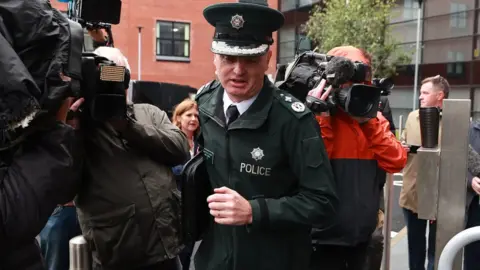 Liam McBurney/PA
Liam McBurney/PAMr Byrne arrived at the policing board's headquarters in Belfast with Mr Hamilton at about 12:15 BST.
They faced questions in a closed-door meeting with the 19-person board, which oversees the Police Service of Northern Ireland (PSNI).
It was the third special meeting the policing board has held within the space of a month.
It met a week ago to follow up on a major data breach, which saw the names of 10,000 officers and civilian staff mistakenly released as part of a response to a Freedom of Information request.
It was one of a number of data breaches involving information about staff.
Low morale within the service has been reported in recent months, with some staff saying they fear for their safety over the breaches.
'Root and branch review'
The policing board is made up of 10 political and nine independent members and holds the chief constable to account.
Sinn Féin and the Democratic Unionist Party (DUP), as the largest nationalist and unionist parties in the mothballed power-sharing executive, each has three seats on the board.
A special session of the board can be called if seven members request it.
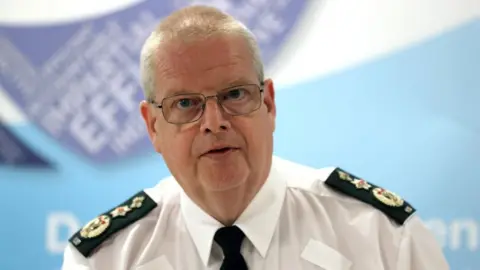 PA Media
PA MediaFollowing Thursday's meeting, UUP leader Doug Beattie called on both the chief constable and deputy chief constable to resign.
He also called for the Department of Justice to commission a "root and branch review" of the policing board - "with particular focus on the efficacy of the way the board and its main sub-committees hold senior officers to account".
DUP MLA and policing board member Trevor Clarke, who had previously called on Mr Byrne to resign, said he had "heard nothing today that would change my opinion".
"There were lots of conversations and questions of both the chief [constable] and the deputy chief [constable] but then we stumbled across a legal issue and for that reason, that part of the meeting came to an end," Mr Clarke said.
He said the chief constable should now be given space to "explore" legal options relating to Tuesday's High Court judgement.
Sinn Féin MLA Linda Dillon reiterated her party's support for "policing and the rule of law", insisting that it had never threatened to withdraw from the policing board.
She also reiterated her party's position that the 2021 arrest was "appalling", but said she would not comment further, given Mr Byrne's indication that he is now considering an appeal of the judgement relating to it.
TUV leader Jim Allister said after the meeting that the policing board had "predictably failed" and, as a result, "the farce continues" with Mr Byrne's "reputation beyond repair".
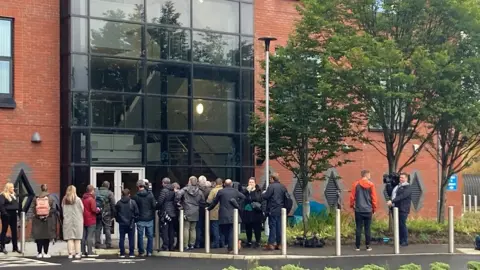
On Thursday morning, SDLP leader Colum Eastwood said there was a serious problem with policing in Northern Ireland.
'Point of no return'
"We are very close to being at a point of no return if we don't fix the recruitment and retention issue," he told BBC News NI.
"The first way to resolve it is to bring 50:50 recruitment back and to deal with some of the cultural issues within the PSNI."
He also said the operation of the policing board needed to be reviewed to improve its accountability.
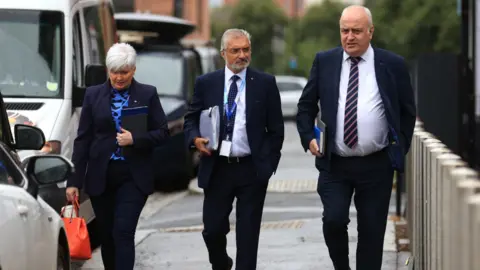 PA Media
PA MediaAlliance leader Naomi Long, who was previously Stormont's justice minister, addressed questions over her contact with Mr Byrne around the time of the Ormeau Road arrest controversy.
She said "at all times" as justice minister she made a "clear distinction" between her role and oversight bodies such as the Policing Board.
"At no time, and on no issue, did I ever seek to influence the chief constable's decision-making in any way," she added.
Mrs Long said she had two phone calls with Mr Byrne after the incident, one of which was a scheduled "routine" communication and the other a briefing on the outcome of a policing board meeting.
"That was a briefing he gave me, I was not there to brief him," she added.
"These are matters ultimately for the chief constable to decide and the chief constable has to account for his conduct."
